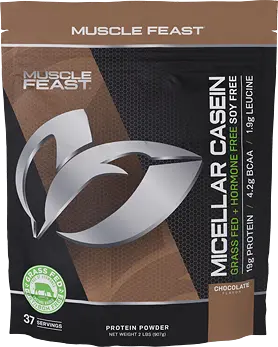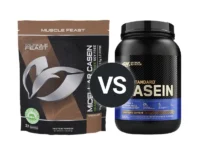Knowledge BaseYou're Questions Answered
Is casein protein powder a complete protein?
Casein protein powder is derived from milk and is known for its slow-digesting properties, making it a popular choice for sustained protein release. One important aspect of any protein source is whether it is considered a complete protein, meaning it contains all nine essential amino acids that the body cannot produce on its own and must obtain from the diet.
Casein Protein as a Complete Protein
Yes, casein protein powder is a complete protein. It contains all nine essential amino acids in sufficient quantities to support various bodily functions, including muscle repair and growth. These essential amino acids include histidine, isoleucine, leucine, lysine, methionine, phenylalanine, threonine, tryptophan, and valine1. The presence of these amino acids in adequate amounts makes casein an excellent source of protein for maintaining and building muscle tissue, particularly when consumed in conjunction with resistance training.
Nutritional Benefits of Casein Protein
- Slow Digesting: Casein forms a gel-like substance in the stomach, which slows down its digestion and the release of amino acids into the bloodstream. This characteristic makes it ideal for providing a steady supply of amino acids over an extended period, such as overnight2.
- High Glutamine Content: Casein is rich in the amino acid glutamine, which plays a crucial role in muscle recovery, immune function, and gut health.
- Sustained Amino Acid Release: The slow digestion rate of casein protein provides a prolonged release of amino acids, making it beneficial for preventing muscle protein breakdown during fasting periods, such as sleep.
Usage and Considerations
Casein protein powder is commonly used in various forms, including shakes, smoothies, and as an ingredient in protein-rich snacks and desserts. It is particularly popular for consumption before bed, providing a slow release of amino acids throughout the night to support muscle recovery and growth. For individuals with lactose intolerance or milk allergies, it is important to note that casein protein, being a milk derivative, contains lactose and may cause digestive discomfort in some people. Choosing lactose-free casein options can help mitigate this issue.
- Phillips, S. M., & Van Loon, L. J. C. (2011). Dietary protein for athletes: From requirements to optimum adaptation. Journal of Sports Sciences, 29(sup1), S29-S38.
- Boirie, Y., Dangin, M., Gachon, P., Vasson, M. P., Maubois, J. L., & Beaufrère, B. (1997). Slow and fast dietary proteins differently modulate postprandial protein accretion. Proceedings of the National Academy of Sciences, 94(26), 14930-14935.
Related Questions

Your Answer
We are a participant in the Amazon Services LLC Associates Program, an affiliate advertising program designed to provide a means for us to earn fees by linking to Amazon.com and affiliated sites.






